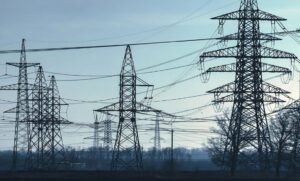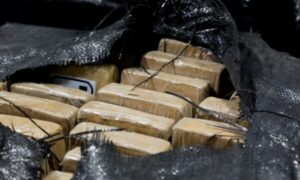
Naftogaz Group increased electricity imports from Europe this week based on a government decision and with the aim of stabilizing the situation in the energy system, said Sergey Koretsky, chairman of the board of Naftogaz of Ukraine.
“The volume of imported electricity already covers more than 50% of the needs of all the Group’s enterprises, as provided for by the government’s resolution,” he said in a Facebook post on Saturday.
Koretsky explained that the corresponding amount of electricity has been allocated for the needs of domestic consumers.
“We are coordinating our actions with the government in order to stabilize the situation in the energy system as quickly as possible after the Russian shelling,” the chairman of the board of Naftogaz emphasized.
As reported, amid the deteriorating situation in Ukraine’s energy system due to massive Russian shelling of energy infrastructure, the government has instructed state-owned companies to increase electricity imports.
During the “Question Time to the Government” in the Verkhovna Rada on January 16, First Deputy Prime Minister of Energy Denys Shmyhal pointed out that, on behalf of the government, Naftogaz of Ukraine, Ukrzaliznytsia, and part of the industrial complex will import at least 50% of their electricity needs.
“This will make it possible to free up 1.5 MW for people’s needs. I hope this will happen in the coming days,” Shmyhal said at the time.

The prolonged cold spell in Europe is pushing gas prices up. The spot price for “day ahead” delivery on the benchmark European TTF hub closed at $486 per 1,000 cubic meters on Wednesday, adding 11% in just one trading day. This is the highest level since June 2025.
On Thursday, trading opened at $491. At the moment, the price has adjusted to $477.
Air temperatures in Europe in January this year are falling to their lowest levels in the last decade and a half. Overall, January (which is already the coldest winter month) is expected to be three degrees colder than the climatic norm and four degrees colder than last year.
Clear weather is accompanied by low wind speeds, or even calm conditions. This increases the load on the power system, as it reduces the output of wind farms. The reliability of the power system is maintained primarily by underground gas storage facilities, which are the most flexible source and closest to the points of consumption.
The average level of gas reserves in underground storage facilities in Europe fell to 48.4% at the end of the gas day on January 20, according to data from Gas Infrastructure Europe. This is 15 percentage points lower than the average for the last five years. At the moment, European underground gas storage facilities are ahead of the usual rate of consumption by four weeks. Moreover, the GIE observation base knows of examples when such a level (or even much higher – 59%) of reserves was reached only by the end of the withdrawal season and the start of injection.
By the end of 2025, countries in the region had purchased 109 million tons of LNG (142 billion cubic meters in regasified volume), which is 28% more than in 2024. In January 2026, liquefied gas imports could reach 10 million tons, which is 24% higher than a year earlier. And this could be a new record for the European gas industry. Despite high demand, there remains a large unused capacity reserve – on January 20, terminals were operating at 51% of their capacity. There is also a noticeable trend of declining LNG stocks at terminals.

According to Serbian Economist, organized crime groups from the Western Balkans have ties in Venezuela and are involved in investigations related to cocaine smuggling, Radio Free Europe (RFE) reports.
According to RSE, networks from the Balkans are considered by international organizations, including Europol and Interpol, to be key players in the supply of cocaine from Latin America to Europe, with Venezuela seen as one of the links in this logistics chain.
Sasha Djordjevic, an expert at the Global Initiative against Transnational Organized Crime (GI-TOC), told RSE that Venezuela is important for cocaine flows as a “strategic outlet” to the Atlantic, although it is not the only and main point of support in the region for Balkan groups.
RSE notes that interest in Venezuela’s role in drug trafficking has intensified following the early January arrest of Venezuelan leader Nicolas Maduro, who has been charged in the US and pleaded not guilty in a New York court on January 5.
As one example, RSE cites the case of the detention of the Aressa off the coast of Aruba in February 2020, when, according to the publication, about five tons of cocaine were seized and 11 Montenegrin crew members were detained. In March 2021, an Aruban court sentenced them to prison terms ranging from nine to 15 years. In addition, according to RSE, Europol linked Serbian citizen Miroslav Starčević, who was detained in May 2023 along with other suspects, to this case, and the proceedings in Serbia are currently under judicial review, according to the publication.
RSE also notes that Europol reported no direct cooperation with Venezuela, so information about the possible involvement of Balkan groups is obtained indirectly – through the law enforcement agencies of the countries in the region, while the Interior Ministries of Serbia and Montenegro, according to RSE, did not respond to requests prior to the publication of the material.

European digital-first banking group Iute Group plans to enter the Ukrainian market by launching a bank under the IuteBank brand with a focus on digital banking services for everyday financial needs, the company said on its website on Tuesday.
“This step is aimed at supporting our long-term goal of expanding digital banking services in a disciplined and responsible manner,” said Iute Group CEO Tarmo Sild.
According to the announcement, the market entry involves an agreement with the Deposit Guarantee Fund (DGF) after approval by the National Bank of Ukraine (NBU).
Under the agreement, Iute Group plans to acquire PJSC “Transitional Bank ”Iute Bank” with a banking license, to which a selective portfolio of low-risk assets and corresponding retail deposit liabilities totaling approximately EUR4 million were transferred from the insolvent RVS Bank.
The expected price of the transaction will be EUR120 thousand, with financing planned from the group’s available liquidity. Iute Group also reported that it expects the net loss of Ukrainian banking operations in 2026 not to exceed EUR3 million.
Upon completion of the transaction, the Ukrainian banking structure is to become the successor to the selected assets and deposit liabilities of RVS Bank. The assets to be transferred mainly include government bonds and cash, while the loan portfolio and related credit risks are not planned to be transferred.
The company expects that around 13,000 retail customers will be transferred as part of the deal, along with their accounts and deposits, but without the branch network.
The bank’s CEO will be Artur Muravitsky, who has over 22 years of experience in the financial sector and previously held the position of deputy chairman of the board of TAScombank and management positions at Ukrposhta, Finance Bank, and VTB Bank in Ukraine.
According to Iute Group, the initial steps after the deal is done will include capitalizing the bank, putting together a key team, and getting ready to launch digital banking services.
As reported, in December, the Deposit Guarantee Fund announced a competition for the best proposal to settle RVS Bank, which the National Bank had declared insolvent. As part of this procedure, the transitional bank Iute Bank was created, headed by Muravitsky.
According to the NBU, as of November 1, 2025, RVS Bank ranked 53rd (UAH 819.8 million) among 60 solvent banks in terms of assets.
According to information on the Iute Group website, it was founded in 2008 by Sild and Allar Niinepuu and is currently a technology-oriented financial services provider serving over 970,000 customers in the Balkans, as well as being present in the Moldovan market since 2008. The group is headquartered in Tallinn, has over 800 employees and more than 50 branches.
Iute Group expanded through several non-bank financial institutions to Albania in April 2015, North Macedonia in September 2017, and Bulgaria in February 2019, and in 2022 acquired a 95% controlling stake in Moldova’s Energbank.
Iute Group provides lending, payment, currency exchange, and insurance brokerage services.

In the temporarily occupied territories of Ukraine, perceptions of the EU and the US are formed not through their own experience, but through the prism of Russian propaganda and information isolation. This was stated by sociologist, director of the Active Group research company Oleksandr Poznyi during his speech at the Forum on Countering Russian Propaganda and Disinformation, held on December 17-18, 2025 in Brussels.
In his speech, the expert relied on the results of sociological studies conducted in 2023-2025 and emphasized that residents of the temporarily occupied territories are virtually deprived of direct communication with Europe and the United States. In such circumstances, the perception of the West is formed mainly through narratives imposed by the occupation authorities. “For many people in the TOT, Europe and the United States are not partners or allies of Ukraine, but abstract, distant actors whose image is almost entirely shaped by the Russian media,” said Poznyi.
According to the sociologist, Russian propaganda systematically forms two dominant images of the West. The first one is aggressive and hostile, which allegedly “controls Ukraine”, “provokes war” and “uses Ukrainians in its own interests”. The second is cynical and indifferent, “tired of Ukraine” and ready to sacrifice its territories for the sake of stability. “These narratives contradict each other but coexist perfectly. They are not about logic, they are about emotion and fear,” explained Poznyi.
As a result, a part of the population has a distorted view of the role of the EU and the US, which has nothing to do with the real policy of supporting Ukraine, but directly affects public sentiment and expectations for the future. One of the key reasons for this perception is complete information isolation. Ukrainian and Western sources of information are blocked or criminalized, and any alternative viewpoints are viewed as “extremism” or “espionage.”
“People cannot verify information. They are forced to live inside an information bubble where the West is an image, not a reality,” the sociologist emphasized. According to him, even those TOT residents who support Ukraine internally often avoid talking about Europe or the United States, as these topics are considered “dangerous” and may arouse suspicion on the part of the occupation structures.
During the forum in Brussels, these observations were presented as a serious challenge for European policy. According to Poznyi, the perception of the EU and the US in the occupied territories will directly affect the processes of de-occupation and reintegration in the future. “If people have been hearing for years that Europe is an enemy or a traitor, these perceptions do not automatically disappear after de-occupation,” he emphasized.
The Forum on Countering Russian Propaganda and Disinformation, held on December 17-18, 2025 in Brussels at the European Parliament and the European Economic and Social Committee, was dedicated to strengthening Europe’s cognitive and information resilience in the face of hybrid threats.
The event brought together representatives of European institutions, think tanks, media and civil society from Ukraine and the EU. The event was aimed at outlining the scope and mechanisms of Russian propaganda, showing its destructive impact on public consciousness, and discussing ways to counter it.